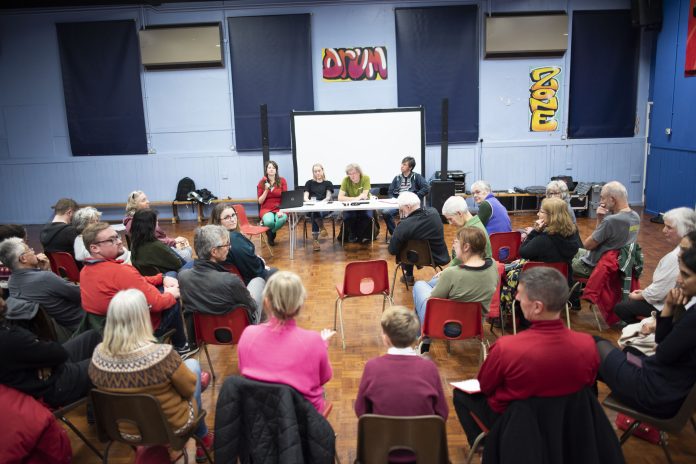Last Friday evening the new short film ‘The Cost of Living’ made by Greenpeace in partnership with the New Economics Foundation, had its launch at Pure Vibes community centre in Whitfield, Glossop.
The film tells the story of volunteers in food banks and community centres in the Rother Valley, Yorkshire, and depicts how communities hard hit by the cost-of-living crisis are pulling together to support each other at this difficult time.
On the eve of the autumn statement, the trailer for the film had been projected onto Prime Minister Rishi Sunak’s house in his Yorkshire constituency to encourage him to address the issues shown in the film.
The event was hosted by Warm Homes Whitfield, a group that, as part of the Great Homes Upgrade campaign, is calling for the cost of living and climate crises to be solved by investing in renewable energy, properly insulating homes and providing people with the skills and training needed to deliver a green energy revolution. The group had personally invited High Peak MP Robert Largen to attend the film launch and hear their concerns, but he didn’t attend.
After the film there was moving testimony from local people about how the crisis was affecting them. Amanda, who said she grew up in a house where her parents made sure nobody was ever cold, spoke of her children going to bed coughing in cold, damp bedding, whilst her energy bills shot up to £300 a month.
Healthcare worker BJ spoke of having to “Keep warm in my little space with my little resources” but told the audience that if they looked to their community, they’d be shocked what power they actually had. Local builder John Walmsley described what it felt like when his children asked “Dad, can we have the heating on”. He added “Change is not a spectator sport. We need to make our MP do his job.”
Heather Kennedy from the New Economics Foundation said after the film that “We can have a good economy, don’t let anyone tell you we can’t, but we’re going to have to fight for it.”
The audience also heard from Greenpeace Political Campaigner Ami McCarthy, who said that renewable energy was now nine times cheaper than fossil fuels, the solution to the climate crisis was also the solution to the cost-of-living crisis. Greenpeace is calling for at least £6 billion to be spent on implementing a national insulation and energy efficiency programme during this parliament. People living in poorly insulated homes will have to pay almost £1,000 more than others on their energy bills this winter
Data from the End Fuel Poverty Coalition shows that almost a quarter of UK households are currently experiencing fuel poverty.
Martin Porter from the Manchester Greenpeace Group, who chaired the discussion after the meeting, said “We can no longer afford fossil fuels. We can’t afford the environmental price, and many people can’t afford the actual price. The fossil fuel giants are making billions of pounds in profits whilst ordinary people struggle to afford to keep warm. What we can afford is home insulation, which saves people money and reduces their carbon footprint. We can’t wait any longer. The government needs to act now.“
Member of Parliament for Manchester Gorton, Afzal Khan will be joining the Manchester Greenpeace Group for a showing of the film in Manchester at 1:30PM on Saturday 26 November at the Friends Meeting House on Mount Street.
Recent polling conducted by Survation on behalf of Greenpeace shows that 69.4% of people in the North of England have had to make cuts to other spending due to rising energy bills, and 61.1% feel that their standard of living has got worse since the last general election. 77.2% in this region would support a government programme to install home insulation in their area.
A recent report by Cambridge Econometrics on behalf of Greenpeace UK, highlights how a government backed programme to insulate homes and install heat pumps could inject £6.8 billion into the economy every year and create almost 140,000 new jobs by 2030. These green home upgrades could provide huge economic and social benefits – including to those on low incomes, older people and People of Colour, who tend to be most exposed to fuel poverty – while slashing bills and carbon emissions







